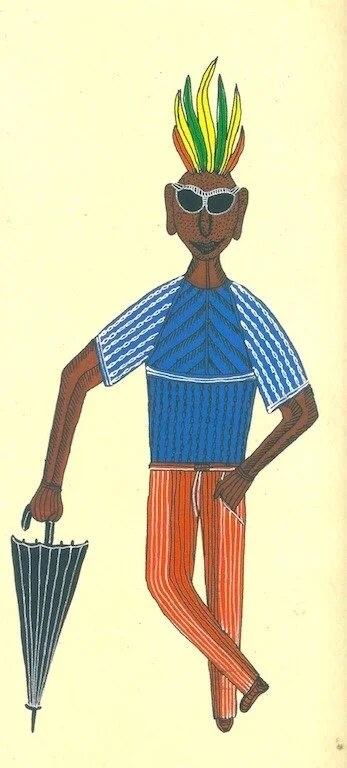The Subversive
Thanks to two hundred-plus years of colonisation and European scholars writing about the East, many of us who come from the East see ourselves primarily through a Western lens.
Basically, East is East, West is West.
But wouldn't it be nice, just once, to turn the tables--that is, have the West see itself through Eastern eyes? It wouldn't have to be as pernicious as the earlier rounds of "othering."
In The London Jungle Book (a reference to Kipling), artist Bhajju Shyam presents the subversive version of "East is East": that is, "West is West."
Shyam, a tribal artist who was transplanted to London to paint murals on the walls of an upscale Indian restaurant there, records his observations on the strangeness of London's culture, just as anthropologists might have done to his community a few decades earlier. Some gems:
"I tried to understand what the people of London were like. The important thing, it seemed to me, was that they were the rulers of their own desires. As long as they didn't break the law, they could do anything they liked, unlike in India where there are plenty of people who question what you do even if you have done nothing wrong. . . It's quite strange. You don't see many people gathering together during the day — sometimes you can even hear the sound of a lone person's footsteps on the street. But in the evening, they all emerge, flocking to restaurants and pubs, wearing their black clothes and laughing. I had to think of bats, the way they wake up in the twilight and start to make their loud noises. Pubs seem to set English people free. . . Big Ben. . . is their temple of time. It's beautiful and carefully built because they are very careful about time here. If you are five minutes early for an appointment, they will tell you to wait because you are early. If you are five minutes late, they will tell you that you are late."
Shyam's art draws heavily on the art of the Gond tribe to which he belongs. You might well ask what sets him apart from his tribal compatriots, who are often dismissed as "mere craftsmen." It is by resisting the "othering" of the modern gaze and by turning his own lens on the culture that would marginalise him that Bhajju Shyam stakes a claim on the title of "artist."
